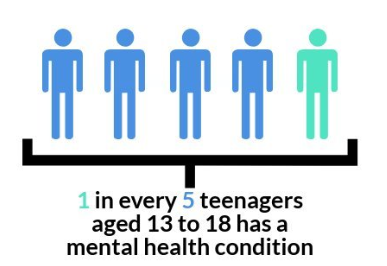Students need more mental health support

*Source: National Institute of Mental Health
October 17, 2018
According to the National Institute of Mental Health, one in every five teenagers aged 13 to 18 has a mental health condition, and the average delay between the onset of symptoms and diagnosis or treatment is 10 years.
The subject of mental health issues in youth has been a popular topic in recent years. For example, the Netflix series “13 Reasons Why” attracted much attention and controversy for its depiction of mental illness, and the online magazine Teen Vogue has been widely praised for its mental health coverage. The former highlighted the lack of mental health resources available to teenagers, a problem many students face every day.
“When you aren’t able to adequately meet mental health needs, problems tend to fester. If you’re able to have early intervention and meet the needs before they get big, you’re better able to manage things,” school psychologist Kristina Crawford said. “But when you’re unable to meet those needs because of a lack of people [trained in child psychology], then a lot of those kids’ problems tend to get bigger.”
Disorders like ADD, ADHD, clinical depression and anxiety can hinder a student’s ability to participate in regular activities and can also impede school performance.
“Not being able to treat symptoms can obviously impact their ability to be focused here at school, their academic achievement and obviously a student’s individual goals that they might have,” school social worker Dana Condemi said.
The need for more mental health support for young people is the result of several factors, one being the deficiency in child psychiatrists and school psychologists.
“There’s been a longtime shortage in my field, and it’s projected to be short in the years to come. It’s not a profession everybody is aware of. I can’t tell you the number of people I run into who say, ‘I didn’t know there was such thing as a school psychologist,’” Crawford said. “Once you learn about it, there may not be as many training programs that are specifically for school psychology.”
In FCPS’s highly competitive environment, fear of failure can increase anxiety and stress and intensify mental health problems.
“I think the academic rigor here is very high, and I think not only that, but I think the expectations that students put on themselves individually and as a peer group is pretty high,” Condemi said.
Students with emotional, behavioral and mental health disorders are 36 percent less likely to graduate from high school, according to the U.S. Department of Education. Because mental illness in students is so detrimental to academic performance, schools have an obligation to address it.
“We’re spending seven to eight hours of our day at school, five days a week,” junior Rachel Rhee said. “We’re basically living at school. So yes, schools have a responsibility to help students with mental health issues.”
Many young people struggle with mental health, and experts say the best step is to seek help. The earlier the intervention occurs, the sooner a student’s situation will improve.
“I encourage you to find someone that you trust to talk to, whether it’s a trusted teacher, a trusted administrator, whether it’s the school social worker, or the school psychologist,” Condemi said. “Find that trusted adult because they can then help you find the services or the person that you need to talk to to get the help that you need.”

